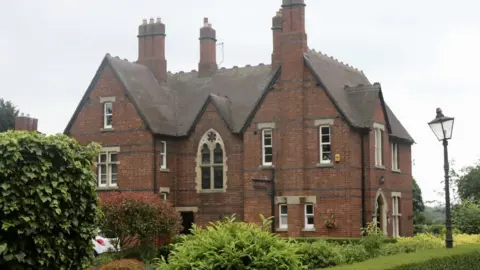Draycott: Former village vicarage threatened with demolition
 Andrew Abott
Andrew AbottCouncillors have stepped in to protect a Derbyshire village's historic former vicarage from demolition.
Draycott's Ferrestone House, which was built in 1875 and features extensive grounds, was sold by the Diocese of Derby in 1961.
A developer now wants to demolish the building, prompting a backlash from concerned villagers.
In response, Erewash Borough Council has issued a preservation order to temporarily halt the demolition.
The developer contacted the council in early September signalling its intention to knock down the Station Road property later this year and asking what permissions were needed from the authority.
Draycott and Church Wilne Parish Council then urged the borough council to take swift action to block the demolition.
It also contacted Historic England to ask for the building to be given permanent listed status, describing it "a fine example of gothic revival Victorian architecture".
A borough council spokesperson said the Building Protection Notice "effectively made Ferrestone House a temporary listed building pending consideration of its value to the nation by Historic England".
The spokesperson added the order lasted for six months or until a decision was reached by Historic England.
'Stay of execution'
Alex Breene, Erewash Borough Council's lead member for town centres, regeneration and planning, said: "Ferrestone House is a much-loved local landmark and the council has taken swift action following residents' concerns over its fate.
"It is now for the secretary of state to determine the building's future."
Resident and parish councillor Roger Brown said they needed to act swiftly after being alerted to the notice for proposed demolition.
"It very quickly became apparent that a proposed demolition of an unlisted building or one not within a conservation area requires no planning permissions under the 'permitted development' rights introduced into law in 2015," he said.
"The listing process can take five-to-six months and in that intervening period a building is not listed until it is listed. We had to act fast and luckily we discovered something called a building preservation notice (BPN) which temporarily protects a building from any development for a maximum of six months."
Mr Brown said the "small stay of execution" would give time for parties on both sides to work together to find a "satisfactory outcome".
"There is no guarantee that the property will ultimately be saved but it would be a tragedy if it was lost and only later found to be historically or architecturally significant and nobody had done anything about it," he said.
"Once it's gone it's gone as the expression goes."
A spokeswoman for Historic England said: "Historic England is currently assessing Ferrestone House for listing and our advice will go over to the Department for Culture, Media and Sport in due course."

Follow BBC East Midlands on Facebook, on X, or on Instagram. Send your story ideas to [email protected].
